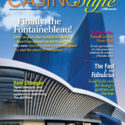
When I got back on the road in earnest as the pandemic started to wind down, everyone I talked to in the industry agreed… it was so good to be back! We all enjoyed connecting in person again. Projects that had stalled were moving forward, new projects were announced, and we were all hoping to move past the year of uncertainty.
Then news started to emerge of freight ships stacked up outside the port of L.A., freight costs flying higher each day, and ongoing projects experiencing delivery delays and material shortages.
When dealing with casino projects, the risks of inexperience, lack of focus on the details or lack of sound methodology are extremely high and can be very costly. For some owners, being back raises the anxiety level over how they can deliver their project.
How do we come back? The current environment makes project purchasing and supply chain management more important than ever.
Here are some tactics owners can employ to help mitigate the risks that the current environment poses to their projects.
Trust the professionals. Building or renovating a casino is different from any other type of project. It requires a unique skill set to handle the scale, design detail, speed. There are qualified professionals that have met and continue to meet to those requirements. Smart owners assemble their team quickly, empower each professional to perform, and hold the team accountable. Coming through the pandemic, strong companies have maintained their teams, servicing their clients and positioning themselves to emerge from the slowdown stronger. From a purchasing perspective, owners should look to purchasing companies that have experience working on casinos, deep vendor knowledge, and a system of checks and balances built into their method of purchasing.
Embrace flexibility. The pandemic has changed the supply chain in ways that are more pervasive than those portrayed by the news media (those stacked-up container ships). Global manufacturing of casino FF&E has shifted and continues to shift locations. China continues to be a major source for FF&E, but owners have reduced their shipping risk by developing sourcing strategies focused on North America and Europe. While this does reduce the delivery risk and typically reduces lead times, the tradeoff can be increased costs and limitations on finishes and materials. In the early planning, be flexible on the best way to execute a design or a product. It will increase the options available to your purchasing company to execute a sourcing strategy.
Expedite effectively. Even with the best strategy, the current manufacturing environment is challenging. Stops and starts in contract production due to limited labor or materials demand flexibility in the project plan. A purchasing company experienced in gaming projects and large purchasing volume can provide insight to owners about how to navigate those challenges. During a project, the quality of the purchasing company’s expediting will more effectively deal with challenges in the supply chain. The earlier a challenge is uncovered, the more options there are to creatively solve the issue. From assisting a manufacturer in locating a raw material to changing a delivery method or location, flexibility comes by getting the information early. In a gaming project, knowing the project’s priorities and collaborating with ownership, design and manufacturing helps everyone succeed.
Start early. In a post-shutdown environment, things just take longer. Design coordination takes longer, construction takes longer, vendors don’t reply as quickly because they are short-staffed or have trouble sourcing their raw materials. The more efficiently a project can move through the design phase into the purchasing phase, the better any issues related to the global supply chain can be identified quickly. Early in the process, an owner should partner with an FF&E and OS&E purchasing company that is focused on gaming. A purchasing company with a sound purchasing management methodology will help develop a project budget based on current market pricing, create an achievable purchasing timeline, recognize project risks, and identify reliable manufacturers.
The conceptual budgeting process is especially valuable as we emerge from the last two years of extreme pricing volatility. We’ve heard from a seating manufacturer that had 176 price increases over 200 days. That type of market data, available to purchasing companies, will inform the development of a conceptual budget during the design phase. An owner with recent pricing data can give designers direction about how they want to allocate design efforts to make the most impact. With extended production and shipping times, a purchasing timeline empowers contractors to plan their critical path activities better and avoid project slowdowns because of poorly coordinated material deliveries.
Most importantly, engaging with a purchasing agent early helps identify project risks from a vendor and material standpoint. Purchasing agents focused on the gaming industry are constantly evaluating vendors’ performance over multiple gaming projects. Instead of worrying about what is unknown or what may have changed over the last two years, owners should press forward with a purchasing company to leverage that industry knowledge and move a project ahead quickly.










